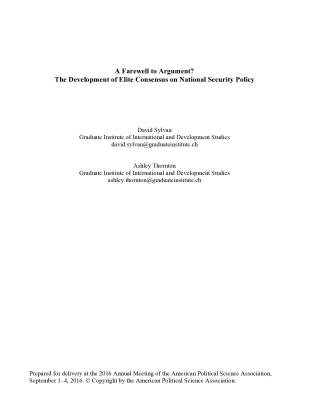Since the attacks of 9/11, numerous states have moved toward national security policies that are costlier, more interventionary, and more intrusive than in the past. To a considerable degree, these changes have been relatively uncontroversial among political elites, particularly members of parliament who approved the relevant legislation (for example, the PATRIOT Act passed the Senate 98-1, and the French National Assembly voted to extend the country's state of emergency by 551- 6). However, since previous threats to national security, while also met with strong responses, were somewhat less consensual (in 1947, for example, Truman Doctrine aid to Greece and Turkey passed the Senate 67-23, and the National Service Act was approved in the UK House of Commons by 232-44), one can ask whether recent threats evoke more of an elite consensus than past ones. To answer this question, which recalls Harold Lasswell's work on the "garrison state," we examine parliamentary debates on national security issues in four countries over 60 years. Specifically, we look not at vote totals, since those often fail to reflect substantial agreement on the nature of international threats and the appropriate national responses; instead, we code speeches for policy reasoning (e.g., "because of situation X we must take action Y") and look for overlaps in reasoning even among legislators who vote in opposite ways. Preliminary analysis suggests that there has been a general move toward consensus: in each country, more recent national security legislation is notably less controversial than analogous legislation was some decades past.



